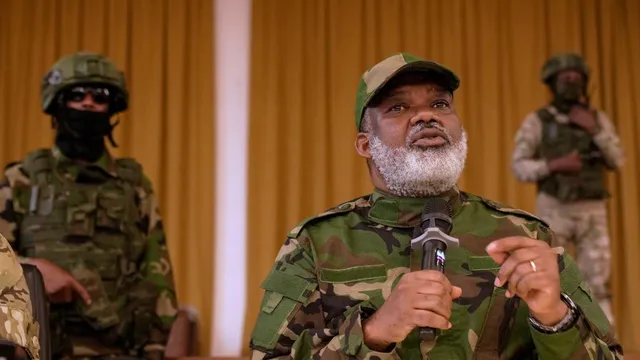
Congo rebel leader dismisses sanctions and mineral deals as ineffective
2025-03-27 23:26- M23 rebels led by Corneille Nangaa have captured key cities in eastern Congo, escalating the conflict significantly.
- International sanctions and a proposed minerals deal with the U.S. have been dismissed by the rebel leader as ineffective.
- The complexity of the situation underscores the necessity for Congolese-led solutions to the ongoing crisis.
Express your sentiment!
Insights
The conflict in eastern Congo has intensified as M23 rebels, led by Corneille Nangaa, have seized control of major cities, including Goma and Bukavu, since late January 2025. These rebels, mainly composed of ethnic Tutsis, aim to secure their community and address grievances stemming from over three decades of instability. Nangaa has stated that international sanctions and a proposed minerals deal between Congo and the United States will not halt the ongoing violence, emphasizing the necessity for Congolese participation in peace efforts. The rebels recently captured the town of Walikale, strategically linking several provinces and cutting off Congolese army positions, which contributes to fears of a broader regional conflict as they threaten expansion towards Kinshasa. The current crisis traces its roots back to historical events, particularly the 1994 Rwandan genocide that led to significant demographic changes in eastern Congo. After the genocide, many Hutus fled to the DRC, creating a complex web of ethnic tensions and armed groups vying for control over the mineral-rich regions. Nanaaa's dismissive attitude towards proposed peace negotiations involving foreign entities reflects a sentiment among rebels that they are not adequately represented. The Congo government has called for international support, including sanctions against Rwanda, which they allege supports M23. Efforts at establishing a ceasefire have faltered, with Nangaa and the rebels expressing skepticism towards dialogues that exclude their involvement. The repercussions of the armed conflict have been dire, with over 7 million displaced people reported, illustrating one of the world’s worst humanitarian crises. As European Union sanctions were enacted, M23 continues to capitalize on the chaos, while instability and potential for violence against civilians persist, urging the U.N. to step in for mediation. Increased global scrutiny of the conflict now calls for urgent action to address the unfolding humanitarian disaster, while international observers emphasize that any sustainable resolution must consider the voices and grievances of the local population. As the situation remains precarious, both local and international actors recognize that a comprehensive solution demands robust dialogue, addressing the root causes of conflict rather than merely temporary fixes. The complex intersection of ethnic identity, geopolitical interests, and resource management will dictate the trajectory of future negotiations and stability efforts in the region.
Contexts
The M23 rebel group, officially known as the March 23 Movement, emerged in the eastern Democratic Republic of the Congo (DRC) in April 2012. The group's formation was prompted by grievances against the Congolese government, particularly relating to the failure to fully implement peace agreements signed in 2009, which addressed the rights of the Congolese Tutsi community. M23 is largely composed of former members of the National Congress for the Defence of the People (CNDP), a previous rebellion that was integrated into the Congolese army following the peace accords. The group accused the DRC government of discrimination, human rights abuses, and the inability to address issues of security and governance, particularly in the North Kivu province, which has long been plagued by conflict and instability. The group quickly gained control of significant territory, including the city of Goma, capital of North Kivu, before being defeated by a joint offensive from the Congolese army and United Nations peacekeeping forces in late 2013. The goals of the M23 rebel group have evolved over time, primarily centering on advocating for political representation and protection of Tutsi interests in the DRC. Initially, the group sought to establish a power-sharing agreement with the Congolese government and remediate alleged injustices against the Tutsi community, particularly in light of the historic tensions following the Rwandan Genocide of 1994 and ensuing regional conflicts. M23 claimed to fight against what it described as systemic exclusion and marginalization of Tutsi people from political processes in the DRC. The group positioned itself as a legitimate political entity, although it has been labeled a terrorist organization by the DRC government and many international observers due to its use of military force and reported human rights violations. Following its defeat in 2013, M23 went through a period of disbandment, with many of its leaders fleeing to neighboring countries, including Rwanda and Uganda. The DRC government attempted to stabilize the region through military campaigns and political dialogues aimed at integrating defectors and former rebels into national institutions. Despite the formal dissolution of M23, its ideology and grievances have persisted in Eastern Congo, contributing to the continuation of violence, particularly as other armed groups have since emerged, utilizing similar narratives of injustice and exclusion. In recent years, the situation in Eastern DRC has remained volatile, emphasizing the ongoing relevance of the M23's goals. Regional dynamics, including the involvement of neighboring countries and the impact of international mining interests, continue to complicate efforts for lasting peace. Furthermore, periodic resurgences of violence and hostility towards the central authorities reflect the unresolved issues that originally propelled M23's formation. To this day, the legacy of M23 highlights a critical need for comprehensive political solutions that address the root causes of conflict and promote inclusive governance, which is paramount for achieving stability in the DRC.